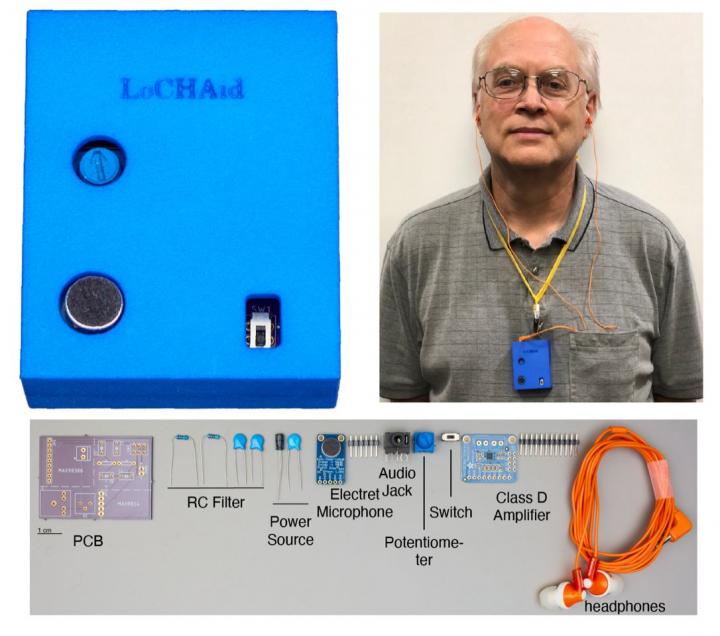
Credit: Sinha et al, 2020 (PLOS ONE, CC BY)
A new ultra-affordable and accessible hearing aid made from open-source electronics could soon be available worldwide, according to a study published September 23, 2020 in the open-access journal PLOS ONE by Soham Sinha from the Georgia Institute of Technology, Georgia, US, and colleagues.
Hearing aids are a major tool for individuals with hearing loss–especially age-related hearing loss, which currently affects approximately 226 million adults over the age of 65 worldwide (and is projected to affect 900 million by 2050). However, hearing aid adoption remains relatively low among adults: fewer than 3 percent of adults in low-and-middle-income countries (LMIC) use hearing aids, versus around 20 percent of adults in non-LMIC countries. Though various reasons contribute to this poor uptake, cost is a significant factor. While the price to manufacture hearing aids has decreased over time, the retail price for a pair of hearing aids ranges from $1,000 to $8,000 USD, with the average pair costing $4,700 in the US.
In this study, Sinha and colleagues used mass-produced open source electronics to engineer a durable, affordable, self-serviceable hearing aid that meets most of the targets set by the WHO for mild-to-moderate age-related hearing loss: “LoCHAid.” When mass-produced at 10,000 units including earphones, a coin-cell battery, and holder, LoCHAid costs $0.98 (this doesn’t include labor costs) and is designed to be marketed over-the-counter–or even as a DIY project. LoCHAid doesn’t require specialty parts, and repairs can be completed by a minimally skilled user with access to a soldering iron and solder. Though it’s not currently programmable, simulations show that the LoCHAid is well fitted to a range of age-related hearing loss profiles for men and women between the ages of 60-79 years.
Potential limitations include the device lifetime (currently 1.5 years), as well as its relatively large size, which may not appeal to all consumers. The authors are currently working on a smaller prototype, but this costs more money to produce and would likely require third-party assemblers.
Despite these limitations, LoCHAid shows great potential to benefit individuals impacted by age-related hearing loss, especially those consumers challenged by the affordability and accessibility of current hearing aids available on the market.
The authors add: “In this work, we describe the development and rigorous audiological testing a minimal, 3d-printed and ultra low-cost ($1 in parts) hearing aid. The vision of the device is to make hearing aid accessible and affordable for elderly individuals with age related hearing loss in low- and middle-income countries.”
###
Citation: Sinha S, Irani UD, Manchaiah V, Bhamla MS (2020) LoCHAid: An ultra-low-cost hearing aid for age-related hearing loss. PLoS ONE 15(9): e0238922. https:/
Funding: M.S.B. acknowledges funding support from Capita Foundation (2018 CFAR award). http://www.
Competing Interests: The authors have declared that no competing interests exist.
In your coverage please use this URL to provide access to the freely available article in PLOS ONE: https:/
Media Contact
Saad Bhamla
[email protected]
Related Journal Article
http://dx.




